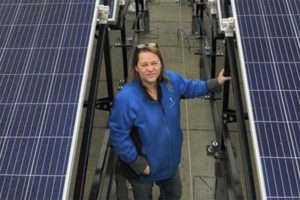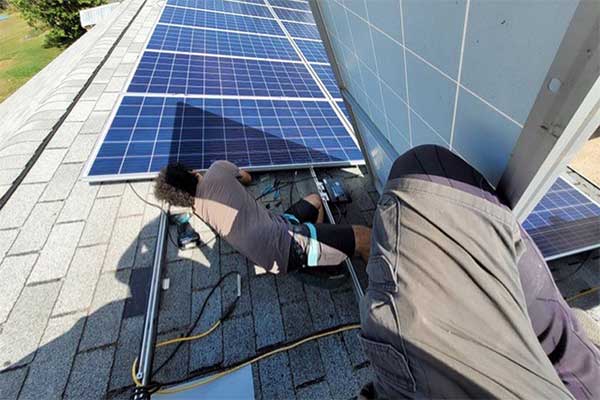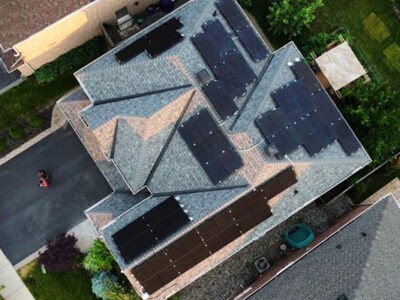- Winnipeg's city council recently adopted "change for solar" which removes a requirement of an Electrical engineer stamp for small-scale residential projects. This move will save residential customers up to $1200.
- An expedited process is now in place to handle solar projects in 10 days, which will also benefit projects over 10kW. Prior to this change, the administrative process for solar could take up to 6 months to complete.
- We explore what's next for the city and the potential for community solar projects with Lorena Mitchell, President of Evolve Energy, Chair of Manitoba Sustainable Energy, and member of the Sustainable Buildings Manitoba Policy Committee.
We spoke with a Winnipeg-based solar business to learn more about the city’s recent solar policy changes and the potential or possibility of community solar in Manitoba.
Homeowners who’ve wanted to—or succeeded in going solar in Winnipeg are familiar with lengthy delays and extra red tape to overcome. Lorena Mitchell, president of Evolve Green and Chair of Manitoba Sustainable Energy, brought this issue to the attention of city councilman Matt Allard. This led to some policy changes being enacted a little more than a year later. Now, solar projects under 10 kW in Winnipeg no longer require an electrical engineering stamp.
“It was highly unusual to need a stamp for small-scale residential systems. You don’t see this anywhere else,” said Mitchell, whose company designs and installs solar systems. She said the stamp costs around $1,200 and the process of obtaining it was long, up to 6 months time.”
There is also now an expedited process for solar projects in the city, which will help streamline the process a bit more. Larger residential projects will also be able to benefit from the expedited process, with the goal being to have paperwork complete in 10 days.
For some of Mitchell’s customers, it was difficult to see the potential of residential solar investment. They were discouraged by the fact that it could take 10 – 12 years for the solar installation to pay for itself, “they look at that total, so that says it takes eleven years, they’re saying ‘wow, it’ll take eleven years to pay for itself?’ well your car is never going to pay for itself,” for example.
A successful solar project in Manitoba is able to make energy at half the cost of purchasing it from the grid.
Mitchell is hopeful the Greener Home Program will help encourage more homeowners to invest in solar since they could be eligible for up to $5,000 back. She believes additional education could help as well, in addition to more tax benefits.

Lorena Mitchell, owner of Evolve Green, says there is now an expedited process for solar projects in Winnipeg, which will help streamline the process a bit more. (Evolve Green)
Efficiency Manitoba has a variety of programs residents can apply to; which can help them transition to a more energy-efficient home. Mitchell said there will be a rebate coming soon for residential solar projects through Efficiency Manitoba, but since it’s currently unavailable, residents will likely not be able to take advantage of it for the 2022 season.
Currently, renewable energy devices are taxed at 12% GST. Mitchell points out how some of the legislature surrounding the eligibility for reduced taxes on the electricity each solar system generates is grey: “It’s 1.4% PST if you’re using the electricity to heat a home. This is interesting because our solar systems are providing energy, which provides heat.” According to the Taxation Division for Electricity and Piped Gas, electricity purchased primarily for heating a dwelling where the purchaser resides is eligible to be taxed at a reduced rate of 1.4% PST in Manitoba.
However, Mitchells explains, it’s intended for Manitoba hydro. Unfortunately, residential solar projects do not qualify; even though many solar systems help heat the home, residential customers are still expected to pay 7% PST. If solar projects could be considered as systems providing heat, it would be a major help to individuals considering going green. Manitoba farmers don’t pay the full tax on a solar system used for heating their farms. If this tax break were to be extended to homeowners as well, it could encourage more residents to adopt solar.
According to Mitchell, other provinces have a more streamlined system for solar projects.
For example, in Ontario and Saskatchewan, the process is done online and is well-tracked. There’s a disconnect in Manitoba, with multiple departments handling elements of the paperwork process. Even though Mitchell’s business is located an hour away from Winnipeg, she had been previously detoured from taking on local projects due to the significant amount of red tape and administrative delays.
The recent policy changes were a good start in helping reduce the challenges solar projects were facing. Of note, the new expediated process will help make Manitoba a more desirable location for large-scale solar developments. It was a step towards a greener Manitoba, but more will have to be done before community solar projects become a reality in the province.
In considering the future of solar in Manitoba, we discussed what would have to change for community solar projects to take off in the province.
Mitchell said: “In our province, we can’t have community solar projects because power has to go to a meter and they don’t split it out after that, they don’t allow for that. Our legislation is one power company, basically, it’s Manitoba Hydro … They have to change that. And it’s been in the work to try and change that because technically car chargers are selling energy. They have to change the language but haven’t done it yet. It’s in the works.”
Manitoba Hydro has a monopoly on power, so the shift would have to start there. Mitchell adds that “right now with community programs, that’s the hitch point. Manitoba Hydro does not allow for community projects … So, for example, we would like to have solar farms that people could buy into locally to offset their own footprint.” The current system would sell power at half rate back to Manitoba Hydro.
Community Solar could be something the province benefits from in the future, but the legislature would have to shift to support such endeavours.













Comments